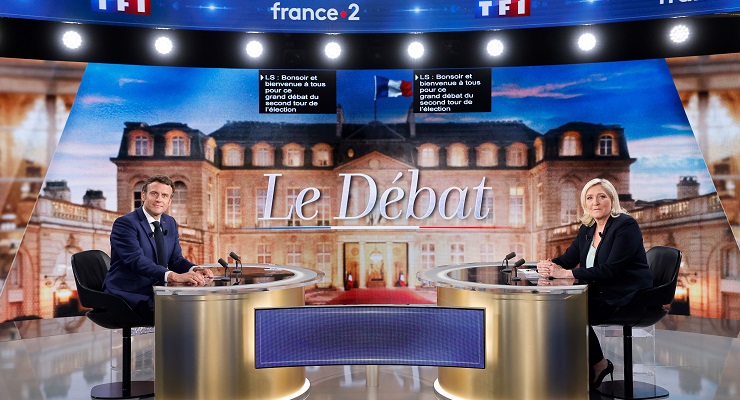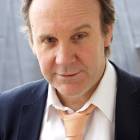
Every time, it’s a sweat. Every time the French go to the polls to elect a president for five years, there’s the possibility of the latest bout of electoral bad humour putting an extremist in the Élysée Palace.
Final round voting in France’s presidential election on Sunday between president Emmanuel Macron and far-right candidate Marine Le Pen pits a democratic candidate against an autocratic, anti-system nationalist-populist for the third time since 2002.
According to the latest radio France Info opinion polling, Macron leads 56%-44% (though with a margin of error of 3.2%), and a BFMTV poll of viewers after a head-to-head television debate Wednesday night suggested Macron may have got the better of Le Pen. Certainly, however, the far right has never been stronger on the cusp of a French presidential election.
The gravity of a possible Le Pen victory is generally under-recognised outside France and particularly perhaps in the Anglo world. This could be why the BBC reported the election campaign as “France on the verge of a Brexit moment” (presumably minus the endless discussion of fishing rights), when a Le Pen presidency would risk the profound non-respect of both democratic freedoms — pluralism, openness, religion — and the rule of law.
“Can democracy be called into question every five years like this knowing that an extreme right or radical left-wing populist will come to power one day?” wrote Liberation’s veteran Brussels correspondent Jean Quatremer last weekend. “Since that is what the opposition in France has been reduced to today.”
It’s something of a French specificity that an election carries such serious consequences, because when populist parties come to power in other Western democracies, either solid “checks and balances” put the stops on extremes or electoral systems require party alignments to find compromises. Unlike in the Westminster system, the US or Germany, the French lower house is weak and the upper house has almost no power.
The French fifth republic constitution, written by General Charles de Gaulle in 1958 (after more than 20 governments amid a chaos of party politics spanning 1946-58), puts a concentration of powers in the hands of a single person to an extent that even the American president would envy.
So what kind of a president might Madame Le Pen be? On the campaign trial she has said that referendums are a “powerful tool” in the “pacifying of political debate”, and that her first referendum would be on “national preference” — in other words, the right to discriminate between “the French” and “foreigners”. And she would demand constitutional change, she has said, to institutionalise that discrimination.
Le Pen has long advocated close relations with the Kremlin. Not based on the German approach of integrating Russia via business and trade, however wrong that strategy has proved to be given Putin’s invasion of Ukraine. No, Le Pen believes the Anglo-Saxon world, particularly “imperialist America”, to be hostile (incoherently, she wants closer relations with Brexit Britain). Here, there is “geopolitical convergence” with, well, a dictatorial regime accused of war crimes after invading a pacifist neighbour. Le Pen condemned the Russian invasion, rhetorically, but is against sanctions on Russian oil and gas and is critical of Western arms deliveries to Ukraine.
Like the rest of us, Le Pen didn’t choose her parents. But her National Rally is essentially a family dynasty, her father establishing the original National Front in 1972. One can imagine the symbolism if, once elected, Jean-Marie Le Pen visited his daughter in the grand pomp of the Élysée Palace — Le Pen père who famously called the Nazi death chambers a “detail of history”.
Le Pen and her supporters argue that raking over history amounts to “Macronite” scare-mongering, when she embodies something empathetic that the president has failed to recognise. Even on Russia, the wellbeing of the French is her first concern, given the impact of the war on the cost of living, for example. This plays into a certain French resistance to putting the best in the class in charge, claimed to be an arrogant moraliser. “Approve of what I tell you to approve of,” in the ironic words of philosopher Julia de Funès. “For I know better than you, where lies what is ‘right and good’.”
But some observers are deeply worried. Under the French Constitution, Article 16 allows the president, with their signature alone, to combine all the legislative and executive powers of the government in the event of some “national peril” (though there must be a serious and immediate threat to the nation’s institutions, or the functioning of constitutional powers, or territorial integrity).
But for a group of legal academics writing in Le Monde, “this guarantee only exists when the president is a democrat who respects the spirit of the institutions. As the sole judge of whether these conditions are fulfilled, an authoritarian president can easily allege, possibly provoke, disturbances, to tip the country into an anti-liberal logic. Neither the Parliament, nor the Constitutional Council or its judges, would be able to prevent the arbitrary use of Article 16, the dangers of which have (often) been vainly denounced.”
From the media corner, one wonders how the BBC reconciled a possible “Brexit moment” with would-be president Le Pen’s attitude to press freedom amply on show during the campaign. Le Pen barred a number of frontline media from her party HQ on the night of the first-round election results announcement — including the BBC.








Apart from the banal polemics, this reads as if it had been written in French then translated by google, ie not very well.
Thank you Richard. I had understood the French president to be powerful, but that article 16 sounds poisonous.
Interesting read, but one would add that Le Pen and her party is compromised also by Russian financing under Putin, then more recently Hungarian under Orban via MKB Bank.
There are many networked (radical right) libertarians in the Anglosphere & Europe (found in US linked think tanks aka Atlas Network & nativist Tanton Network* i.e. muse of Steve Bannon), supportive of Putin, Brexit and Trump, who are happy to ignore foreign financing, while promoting Macron as weak or flawed; indirect and careful support for Le Pen (an Oz advisor to a trade envoy has done recently by comparing UK PM Johnson positively on ‘leadership’ vs. Macron….).
*Central to publishing and promoting French author Jean Raspail’s Camp of the Saints a generation ago, central to the ‘great replacement’ (refined by Renaud Camus).